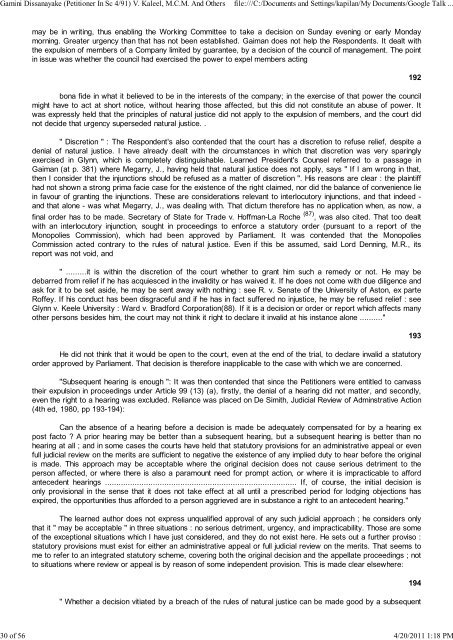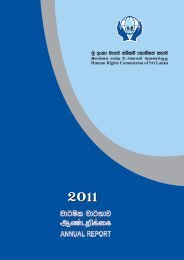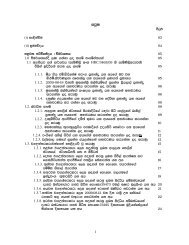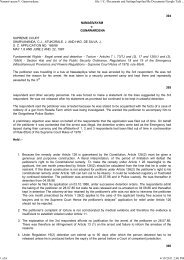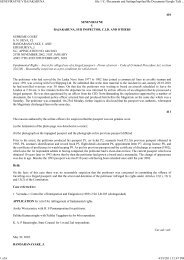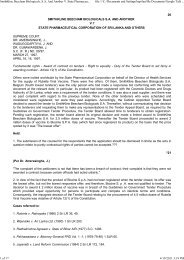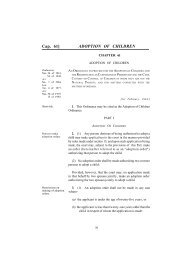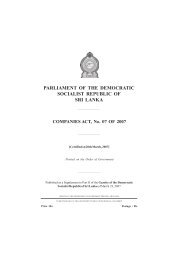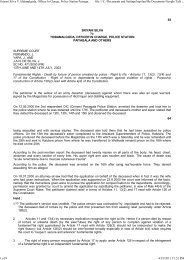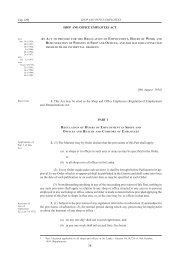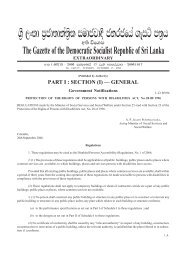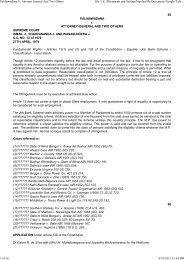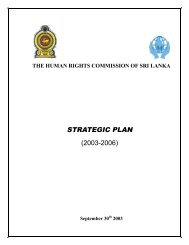Gamini Dissanayake (Petitio... - Human Rights Commission of Sri ...
Gamini Dissanayake (Petitio... - Human Rights Commission of Sri ...
Gamini Dissanayake (Petitio... - Human Rights Commission of Sri ...
Create successful ePaper yourself
Turn your PDF publications into a flip-book with our unique Google optimized e-Paper software.
<strong>Gamini</strong> <strong>Dissanayake</strong> (<strong>Petitio</strong>ner In Sc 4/91) V. Kaleel, M.C.M. And Others file:///C:/Documents and Settings/kapilan/My Documents/Google Talk ...<br />
may be in writing, thus enabling the Working Committee to take a decision on Sunday evening or early Monday<br />
morning. Greater urgency than that has not been established. Gaiman does not help the Respondents. It dealt with<br />
the expulsion <strong>of</strong> members <strong>of</strong> a Company limited by guarantee, by a decision <strong>of</strong> the council <strong>of</strong> management. The point<br />
in issue was whether the council had exercised the power to expel members acting<br />
bona fide in what it believed to be in the interests <strong>of</strong> the company; in the exercise <strong>of</strong> that power the council<br />
might have to act at short notice, without hearing those affected, but this did not constitute an abuse <strong>of</strong> power. It<br />
was expressly held that the principles <strong>of</strong> natural justice did not apply to the expulsion <strong>of</strong> members, and the court did<br />
not decide that urgency superseded natural justice. .<br />
" Discretion " : The Respondent's also contended that the court has a discretion to refuse relief, despite a<br />
denial <strong>of</strong> natural justice. I have already dealt with the circumstances in which that discretion was very sparingly<br />
exercised in Glynn, which is completely distinguishable. Learned President's Counsel referred to a passage in<br />
Gaiman (at p. 381) where Megarry, J., having held that natural justice does not apply, says " If I am wrong in that,<br />
then I consider that the injunctions should be refused as a matter <strong>of</strong> discretion ". His reasons are clear : the plaintiff<br />
had not shown a strong prima facie case for the existence <strong>of</strong> the right claimed, nor did the balance <strong>of</strong> convenience lie<br />
in favour <strong>of</strong> granting the injunctions. These are considerations relevant to interlocutory injunctions, and that indeed -<br />
and that alone - was what Megarry, J., was dealing with. That dictum therefore has no application when, as now, a<br />
final order has to be made. Secretary <strong>of</strong> State for Trade v. H<strong>of</strong>fman-La Roche (87) , was also cited. That too dealt<br />
with an interlocutory injunction, sought in proceedings to enforce a statutory order (pursuant to a report <strong>of</strong> the<br />
Monopolies <strong>Commission</strong>), which had been approved by Parliament. It was contended that the Monopolies<br />
<strong>Commission</strong> acted contrary to the rules <strong>of</strong> natural justice. Even if this be assumed, said Lord Denning, M.R., its<br />
report was not void, and<br />
" .........it is within the discretion <strong>of</strong> the court whether to grant him such a remedy or not. He may be<br />
debarred from relief if he has acquiesced in the invalidity or has waived it. If he does not come with due diligence and<br />
ask for it to be set aside, he may be sent away with nothing : see R. v. Senate <strong>of</strong> the University <strong>of</strong> Aston, ex parte<br />
R<strong>of</strong>fey. If his conduct has been disgraceful and if he has in fact suffered no injustice, he may be refused relief : see<br />
Glynn v. Keele University : Ward v. Bradford Corporation(88). If it is a decision or order or report which affects many<br />
other persons besides him, the court may not think it right to declare it invalid at his instance alone .........."<br />
He did not think that it would be open to the court, even at the end <strong>of</strong> the trial, to declare invalid a statutory<br />
order approved by Parliament. That decision is therefore inapplicable to the case with which we are concerned.<br />
"Subsequent hearing is enough ": It was then contended that since the <strong>Petitio</strong>ners were entitled to canvass<br />
their expulsion in proceedings under Article 99 (13) (a), firstly, the denial <strong>of</strong> a hearing did not matter, and secondly,<br />
even the right to a hearing was excluded. Reliance was placed on De Simith, Judicial Review <strong>of</strong> Adminstrative Action<br />
(4th ed, 1980, pp 193-194):<br />
Can the absence <strong>of</strong> a hearing before a decision is made be adequately compensated for by a hearing ex<br />
post facto ? A prior hearing may be better than a subsequent hearing, but a subsequent hearing is better than no<br />
hearing at all ; and in some cases the courts have held that statutory provisions for an administrative appeal or even<br />
full judicial review on the merits are sufficient to negative the existence <strong>of</strong> any implied duty to hear before the original<br />
is made. This approach may be acceptable where the original decision does not cause serious detriment to the<br />
person affected, or where there is also a paramount need for prompt action, or where it is impracticable to afford<br />
antecedent hearings .................................................................................... If, <strong>of</strong> course, the initial decision is<br />
only provisional in the sense that it does not take effect at all until a prescribed period for lodging objections has<br />
expired, the opportunities thus afforded to a person aggrieved are in substance a right to an antecedent hearing."<br />
The learned author does not express unqualified approval <strong>of</strong> any such judicial approach ; he considers only<br />
that it " may be acceptable " in three situations : no serious detriment, urgency, and impracticability. Those are some<br />
<strong>of</strong> the exceptional situations which I have just considered, and they do not exist here. He sets out a further proviso :<br />
statutory provisions must exist for either an administrative appeal or full judicial review on the merits. That seems to<br />
me to refer to an integrated statutory scheme, covering both the original decision and the appellate proceedings ; not<br />
to situations where review or appeal is by reason <strong>of</strong> some independent provision. This is made clear elsewhere:<br />
" Whether a decision vitiated by a breach <strong>of</strong> the rules <strong>of</strong> natural justice can be made good by a subsequent<br />
30 <strong>of</strong> 56 4/20/2011 1:18 PM<br />
192<br />
193<br />
194


